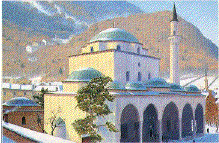
A mosque is a place of prayer for muslims.
Part A. Where Do I Pray?
The
Blessed Prophet taught us that the entire world is our Masjid. The word
Masjid means place to bow down. Often times Muslims will go to a special
building to pray together in groups. Those buildings are also called
Masjids. In English the word for Masjid is Mosque. A Muslim prefers to use
the word Masjid because it means a place of prayer. The word "Mosque" was
invented by Spanish Christians over five hundred years ago and means
"Mosquito" in their language. They boasted that they would stamp out every
Masjid in Spain like swatting"mezquitas." Therefore. the term "Mosque" is
offensive to us.
Sometimes Muslims will find themselves outside when
prayer time comes. We can pray outside of a Masjid if we have to because
the entire earth is our Masjid. The only places we are not allowed to pray
in are dirtv areas, such as muddv fields or the bathroom. The place must
be clean. Muslims usually like to pray on prayer rugs or mats, but you can
also pray on grass, cement, wood floors or anywhere else that is
clean.
All Muslims face the direction of Mecca, in Arabia, when they
pray. The direction of Mecca is called the Qiblah. We pray towards Mecca
not because our Prophet was born there. but because there is a special
building there called the Ka'bah. The word Ka'bah means. "a cube or
square-shaped thing."
The Ka'bah is an ancient or old, place that was
chosen by Allah to be the main place for people to pray to Him. It is the
place that an ancient Prophet named Ibrahim built so that all the people
of the world would have a common place to come to when they wanted to
really show how much they love Allah.
Every Masjid in the world is
built facing in the direction of Mecca. When Muslims gather together to
pray this is called making Salat in Jam'a. The word Jam'a means "group.'
When Muslims pray in Jam'a. one person will stand in front of the others
and act as the leader of the prayer. Such a person is called the Imam, or
leader, Everyone praying behind an Imam follows along with him or her.
Every prayer consists of two up to four cycles called Rak'as. One
series of standing, bowing and prostrating (bowing on the floor twice)
equals one ra'kah. Fajr has two rak'as. Zuhr. 'Asr and 'Isha have four
rak'as. Maghrib is the only regular Salat that has three rak'as. The
prayer that will be explained on the following pages will consist of two
rak'as.
In Fajr all Surahs are said aloud. In Zuhr and 'Asr Salats all
Surahs are said silently. In Maghrib and Isha, the Surahs are said aloud
only in the first two rak'as.
Just like with Wudu and anything else important, we begin our Salat with Niyyah, or intention. This way we make it clear to ourselves what we're doing before we begin. While facing the Qiblah, properly dressed and in a state of Wudu, we say silently to ourselves, "Nuwaytus Salatul ___ " What we say in the last space is the name of the prayer we are doing.
Then we begin the Salat itselfby raising our hands to our ears and saying, "Allahu Akbar." Which means, "Allah is the Greatest." Females raise their hands only to their shoulders. Then we fold our hands over our lower chest. Females fold their hands over their upper chests. The right hand goes over the left. Some Muslims like to pray with their hands hanging loosely from their sides. This is allowed also, but it is better to fold your hands in front ofyou, right over left, based on an abundance of Hadiths about it.
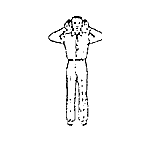 |
Step 1 Raise hands up and say, "Allahu Akbar." Males raise their hands up to the side of their head. Females raise their hands lust up to the shoulder level. After performing this beginning motion of the Salat, a person must think of themselves as cut off from the outside world until they are finished. |
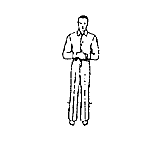 |
Step
2 Fold right hand over the left in front of you. Then say, "Subahanakal lahumma wa behamdika, Wa tabaruka ismuka, wa ta 'ala jeduka, wa Ia ilaha ghairuka." Then recite, "Ow thzu billa himina Shaytan ir rajeem." |
(It means: "Glory to You, Allah, and praise by You. Blessed is Your Name, great is Your Highness and their is no god except You.") (It means: "I ask Allah to protect me from the rejected Shaytan.") |
While we are standing in that position, which is called, Qiyam, or standing up we must take care not to look around or move our bodies. From the moment we said, Allahu Akbar," the prayer started and we shouldn't do anything except what is allowed in the praver until we finish. lf we laugh, start to talk or walk around, then that Salat is broken and we have to start all over again.
The very next thing we should say is what Allah called the greatest Surah, or chapter of the Holy Qur'an.
It is the one Surah that Allah gave us that has every thing for us in just seven little verses, or ayahs. It is such an important Surah that if we to forget to say it in our Salat then the whole Salat doesn't count. Here is the Arabic text ot that Surah, which is called Al Fatiha, or the Opening, along with the English meaning. In the Salat we say it in the Arabic only.
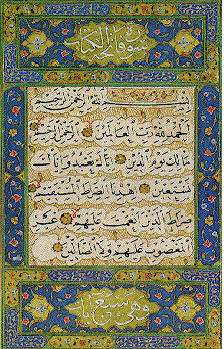
The surah Fatihah from the Quran
The Prophet s.a.w. said in Hadith Al Qudsi: "Allah Ta'ala said, "I have divided the prayer (recitation of the Fatihah) into different parts of dialogue between Me and My slaves, and it is up to My slaves to ask Me anything."
Surah al Fatiha is said in Arabic this way:
"Bismillahir Rahmanir Raheem Alhumdulil lahir Rabbil 'alameen, Ar Rahmanir Raheem Maliki yowmid deen 'Eiyaka na'budu wa 'eyaka nasta'een Ihidinas siratal mustaqeem Sirat aladheena an 'amta alayhim, Ghayril maghdoobi 'alayhim Wa lad dawleen. "
(It means: "In the Name of Allah, the Caring and the Kind. Praise be to Allah, the Lord of the Universe; the Caring and the Kind and Master ofthe Day of judgment. You alone
do we serve and to You alone do we turn for help. Guide us in the straight way. The way of those who You are happy with, not the way of those who Your angry with, and not the way of those who have gone astray")
After saying Surah al Fatiha, we say another portion of the Qur'an. It can be as little as three ayahs long or even a whole long Surah! Most people say short Surahs such as Al Ikhlas or Al Nas. In a third or fourth Rak'a of a prayer, only Fatiha is said before going into bowing. But as we are still in the first two rak'as, we must say more Qur'an here.
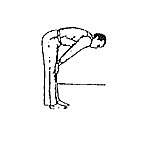 |
Step 4 After completing the Surah, the next thing you do is say, "Allahu Akbar." Then you bend forward at the waist and put your hands on your knees. This is called Ruku. You say silendy, "Subanna Rabbial Owdheem." at least three times. There are other similar phrases that are also allowed to say. The basic phrase said here means, "Glory to my great Lord." |
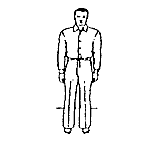 |
Step 5 Then we say, "Sami' Allahu liman hamida" (Allah hears those who praise Him,) and return to a standing position. But our hands are left loose at our sides. We can also add the phrase, "Rabbana lakal Hamad." Which means,"Our Lord to You belongs all praise." |
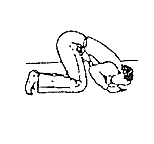 |
Step
6 Then we say, "Allahu Akbar" and lower ourselves to our knees and make Sajda, or bowing on the floor. Our elbows must stay up in the air and our feet must be raised up so that the bottom our toes are on the ground. Place your hands on the floor on the side of your head. Your nose and forehead are touching the ground. Say three times, "Sub-hanna Rabbial 'ala." It means,"Glory to my Lord the Most High." |
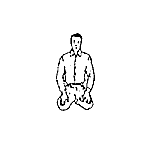 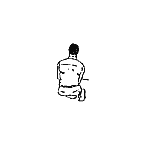 |
Step
7 Then we say, "Allahu Akbar" and sit up on our knees for a moment. Women sit a little to their left side while men keep their right foot raised up. |
 |
Step
8 Next say, "Allahu Akbar," and do one more Sujud and say the same phrase three times that you said before. |
 |
Step
9 Then say, Allahu Akbar," and return to a standing position with your hands folded in front of you. That was one Raka', or cycle of prayer. |
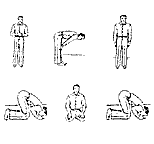 |
Step
10 Now pretending that we were doing Fajr Salat, which has two Raka's, we still have to complete another one. That is easy. All you have to do is repeat steps 3-8. But after saying Surah al Fatiha, choose a different Surah to say afterwards than what you said in the first Raka'. So, for example, if we said Surah al Ikhlas in the first Rak'a, in our second Raka', after al Fatiha, we'll say Surah Nas, or which ever one we choose! After the end of the second Sajda, instead of standing up after saying, "Allahu Akbar" we will return to a sitting position and stay there. (Note: If you were doing a 3 or 4 raka' Salat, all Qur'an reciting will be silent, said to one's self.) |
 |
Step
11 While sitting we will say a special set of supplications and phrases. The first phrase we say is this: "Atay hiyatu lillahe wa salawatu wa tayyibatu. Assalam 'alayna Wa 'ala 'ibad 'ilahas sawliheen." Then you raise the index finger while saying the next phrase: "Ashahadu an la ilaha ill Allah, wahdahu laa shareeka lahu, Wa ashahadu anna Muhammadan 'abduhu wa rasoolhu. |
(It means: "All purity, prayer and goodnes belong to Allah. Peace upon you Prophet (SAW) and Allah's mercy and blessings. Peace be upon all righteous servants of Allah. I declare that there is no god but Allah, He is One with no partners, and I declare that Muhammad is His servant and Messenger.") |
| Step 12 Then you say the prayer called the Durood which is a meant to ask Allah to bless the Prophet. words of the Durood * are as follows: "Allahumma salee 'ala Muhammadin wa 'ala 'alee Muhammadin, kama salayta 'ala Ibrahima wa 'ala aalee Ibrahima, Innaka hameedun majeed.Ailahumma barik 'ala Muhammadin wa 'ala 'alee Muhammadin Kama barakta 'ala Ibrahima wa 'ala aalee Ibrahima fil 'alameen. Innaka hameedum majeed." (* Note: There are other valid ways to say the Durood.) |
(It means: "Allah send blessings on Muhammad and on the family of Muhammad, just ilke You put blessings on Ibrahim and on the family of Ibrahim, You are worthy of all praise, the Majestic. Allah grace Muhammad and the family of Muhammad, just ilke you put grace on Ibrahim and the family of Ibrahim in the world. You are worthy of all praise, the Majestic.") |
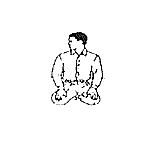 |
Step
13 Then you turn your face to the right and say, Assalamu 'alaykum wa rahmatullah. |
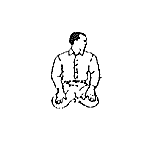 |
Step
14 Then you turn your face to the left and say, Assalamu 'alaykum wa rahmatullah. |
Your prayer is now finished and you can rise and go about your business. It is recommended to stay seated, however, and say some small phrases to remember Allah. Then personal requests to Allah for forgiveness or guidance can be made. (This is called making dhikr and then making Du'a.)
Usually after each prayer the Prophet with zikir, i.e. he will recite :
Allahhuma Antassalaam Wa Minkassalaam, Wa Ilaika Ya'uu Dus-Salaam, Fahaiyinaa Rabbanaa Bissalaam, Wa Adkhilnal Jannata Daaras-Salam, Tabaarakta Rabbanaa Wa-Ta 'Aalaita Yaa Dzaljalali Wal-Ikram (1x)
(O Allah, you are the God of Peace and the Source of Peace. To You all peacefulness shall return. Give us a peaceful life and let us enter the "House of Peace" (Heaven). O Lord, You possess Abundance, You are the Most High, O the Possessor of Might and Honour.)
Subhaa Naalah (33x)
(All praises for Allah)
Al Ham Du Lillah (33x)
(All thanks to Allah)
Allahu Akbar (33x)
(Allah is Great)
La Ila Ha Illallah Wah Dahu La Sharikala Hu Lahul Mul Ku Wala Hul hamdu Wa Hu Wa 'Alaaku Li Shai In Qadir (1x)
(None has the right to be worshipped but Allah and He has no partner in Lordship nor in worship nor in the Names and the Qualities and for Him is the Kingdom and all the praises are for Him and Omnipotent).

 Click Here to Mail Me
Click Here to Mail Me